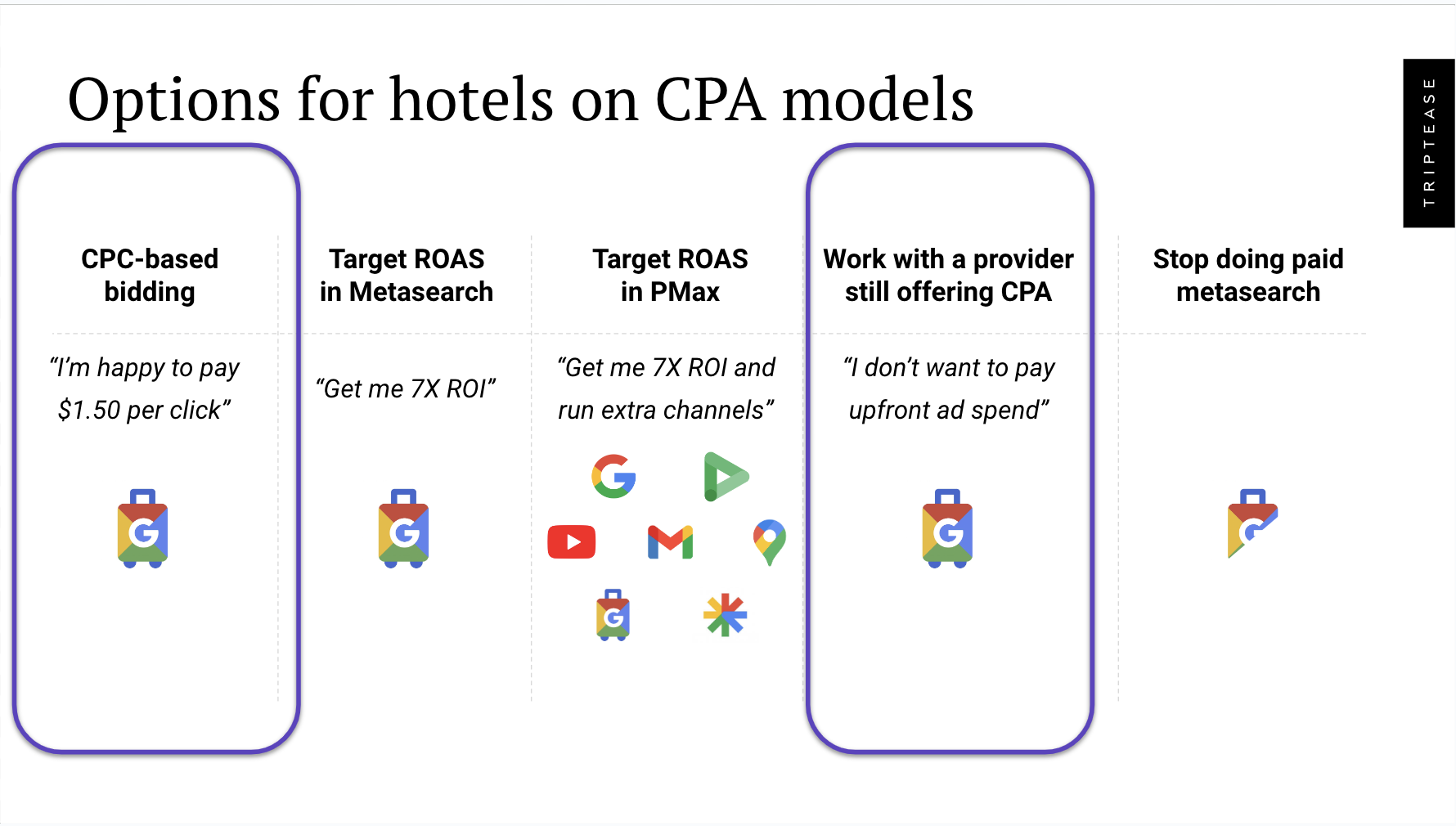Ahead of Google’s removal of commission-based metasearch this February, learn about the two main payment models – and decide which one is right for you.
NB: This is an article from Triptease, one of our Expert Partners
Subscribe to our weekly newsletter and stay up to date
Google has announced that their planned removal of commission bidding on metasearch will be pushed back from October 2024 to February 2025. While those extra few months have hoteliers on CPA breathing a sigh of relief, it’s still a wakeup call. For those running metasearch on a CPA model, the deadline to find a new way to access metasearch is approaching, and fast.
While hoteliers have a few different options for how they continue to access metasearch (you can learn more in our blog and video here), the two core methods are currently CPC (cost-per-click) and CPA (cost-per-acquisition). Triptease is able to run both types of campaign for hoteliers – and will continue to do so even after Google’s deadline has passed. In fact, our bidding models incorporate unique hotel data that Google doesn’t access, allowing us to tailor our algorithms and to even outperform Google. But what are the key differences between CPC and CPA, and what are the pros and cons of each?

Cost-Per-Click
CPC, or Cost-Per-Click, is the most traditional way to work on metasearch. With CPC, you’ll pay a negotiated price for every click on metasearch — and will have to provide upfront ad spend. Nothing will be refunded in the case of cancelled bookings, so there’s an element of uncertainty. By working with a metasearch connectivity partner like Triptease, you’ll benefit from expertise and improve your performance, but you will also have to pay a monthly licence fee on top of any ad spend.
Benefits of CPC
- Higher ROI: Typically CPC campaigns see a better return on investment, as with CPA campaigns the rate charged per acquisition has to incorporate the risk of cancellations and lost bookings.
- Flexibility: Ability to bid on a more granular level, plus the flexibility to change your campaigns at any point to maximise the effect of seasonal campaigns or promotions.
- Control: You decide the maximum amount you’ll bid for each click, which you can easily flex in real time to align with your goals.
- Performance: While CPC requires closer monitoring, working with an experienced metasearch provider like Triptease can help to lessen your load and give you the benefits of CPC without the daily bid management.
Downsides of CPC
- Upfront cost: You’ll need to be able provide ad spend on a monthly basis, and may need to flex the amount in order to optimize your campaigns.
- Greater exposure to risk: As you’ll be paying for clicks and not bookings, this can be a riskier option, particularly for hotels with lower website conversion rates.
- Internal barriers: It may be harder to get the budget signed off for the upfront spend required for PPC, particularly if your hotel is new to metasearch or you have strict budgeting regulations.
Who does the CPC model work best for?
- Hoteliers who are confident in their website conversion rates.
- Hoteliers able to obtain the upfront ad spend required to maximise their metasearch CPC campaigns.
- Hoteliers who have high ROAS targets and want to maximise their spend as much as possible.
- Hoteliers who require flexibility in their marketing – if you’re running a lot of promotions or will need to flex your maximum bids on a regular basis, CPC is the route for you.
Cost-Per-Acquisition
With CPA, or Cost-Per-Acquisition, hoteliers only need to pay when a guest from metasearch actually completes a booking on their site.
CPA was introduced by Google during the pandemic in response to the uncertainty of the travel industry. It’s been a great option for hoteliers who are more risk adverse and want to guarantee return on their spend, but typically comes with a significant lower ROI than CPC. It also provides less control over performance.





